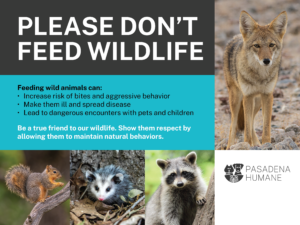Do Not Feed Wildlife
WHY FEEDING WILDLIFE IS ACTUALLY HARMFUL
While you might think you are helping or even bonding with wildlife by feeding them, feeding wild animals hurts them and can have negative impacts on entire ecosystems.
- Human food is unhealthy and addictive: Wildlife may stop hunting, foraging, or scavenging as they would naturally and start relying on humans for handouts. Human food is nutritionally insufficient for wildlife. It can make them seriously ill and cause fights and increase disease transmission when they congregate over these resources.
- It can cause wildlife to become more tolerant of humans: Wildlife may become conditioned to people when they start to associate us with food. They may even damage property trying to get it. Wildlife that are regularly fed may approach humans, and some people might misunderstand this behavior, thinking the animals are tame like our pets at home. Many of the bites and injuries to humans from wildlife are because of conditioning from feeding.
- Feeding wildlife puts them in danger: Animals that are fed by humans learn to frequent roadsides and parking lots, dramatically increasing their chances of being hit by a motorist, becoming involved in altercations with domestic pets, or meeting unfriendly humans who wish to do them harm. Larger predatory species such as bears and coyotes may be at risk of capture and euthanasia if they become too comfortable near humans, lose their natural fear, and are deemed a public health risk.
Be a true friend of wildlife and show them respect by allowing them to maintain natural behaviors.
Here are some ways you can safely interact with wildlife and prevent accidental feedings:
- Securely store all food and trash. You may be unintentionally feeding wildlife by leaving trash or crumbs.
- Keep pet food and water containers indoors.
- Be sure to clean up after meals and practice “Leave No Trace” principles when on trails.
- Always keep a safe distance when observing wildlife and never approach and offer food. If you want a closer look, use a pair of binoculars.
- Haze wildlife that seems too comfortable around you by making loud noises and scaring them away. This may initially feel like the opposite of kindness, but it is the kindest thing you can do for them.
- If you see an animal that may be orphaned, injured, or distressed, contact our wildlife helpline by sending a photo and short description including location to 626.344.1129. Do not attempt to rescue or feed the animal without guidance from a licensed wildlife rehabilitator.
* Adapted from USFW https://www.fws.gov/story/hidden-harm-feeding-your-local-wildlife
DOWNLOAD A YARD SIGN
Assistance
If you have need immediate help with injured or ill wildlife, call or text our wildlife helpline at 626.344.1129 during the hours of 9am to 6pm (text preferred). For after-hours assistance, call our animal control dispatch at 626.792.7151 ext. 102. For non-emergency wildlife questions, please email wildlife@pasadenahumane.org.
There are many humane alternatives to trapping wild animals, and we are available to assist you. We will only pick up trapped wildlife only if the animal is sick, injured, orphaned, or has bitten a person or another animal.



